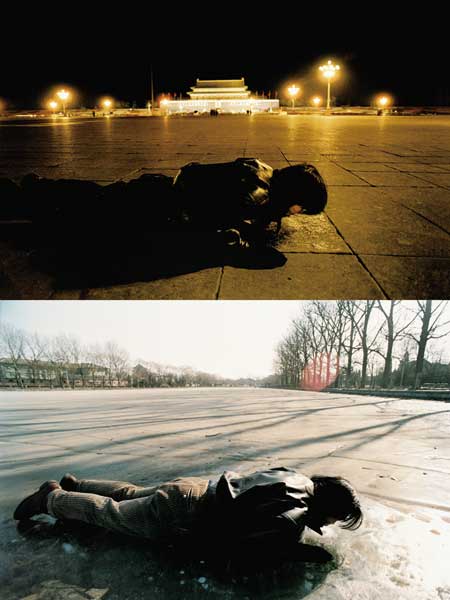Performance art's rare retrospective a poignant mix
Although still not fully embraced by all in the Chinese art world, performance art has made a mark for itself in Chinese modern art history with its particular role of pioneering in the avant-garde genre after the Cultural Revolution (1966-76) and continually calling for creativity after China turned to a market economy in the 1990s.
|
Performance piece Breathing by Song Dong. [Global Times] |
With the exhibition Great Performance currently being held at Pace Beijing, people finally have a chance to observe performance art and its development since the 1990s, when artists called for independence in creation with their own bodies and hearts, often in an extreme way that some find hard to accept.
The exhibition presents more than 20 artists known for their creativity, including some of the most exciting performance artists, Zhang Huan, Zhang Dali and Zhao Bandi, using materials such as photography and videos documenting their representative performances on display.
One of the highlights of the exhibition is a picture of Zhang Huan's performance To Raise the Water Level in a Fish Pond (1997). Zhang invited 40 migrant workers to join his performance and had them stand silently in a pool. Then he himself also entered the pool, carrying a child on his shoulder.
The picture on display vividly portrays the moment when Zhang and several migrant workers are standing in the pool, all half submerged in water and with empty looks on their faces.
With the piece Zhang shows his perceptive insight into migrant workers, then an emerging social group, earning their living by constructing cities. Migrant workers later attracted international attention after entering the new millennium and they are now known as a widely-existing social class across China.
Zhang was among the most devoted performance artists in the 1990s, with his pieces harshly criticizing various social phenomena. He is most famous for his performance piece in which he covered himself with honey and sat naked in front of a fetid public restroom outside of Beijing, until he was completely covered in flies.
Zhang previously told Global Times that all of his performance pieces are thorough exposures of his deep love and hate toward the country, to everything happening within it and that he never cares about whether people welcome his work or not.
"Art sometimes is about the cruel truth, not always being enjoyable for everyone," he said.
Among all forms of avant-garde art in China since the late 1970s that were devoted to freedom in artistic creation, performance art has always been the most radical warrior, with artists trying their best to call for freedom in thought and exposing social problems, according to Leng Lin, director of Pace Beijing.
 0
0 








Go to Forum >>0 Comments